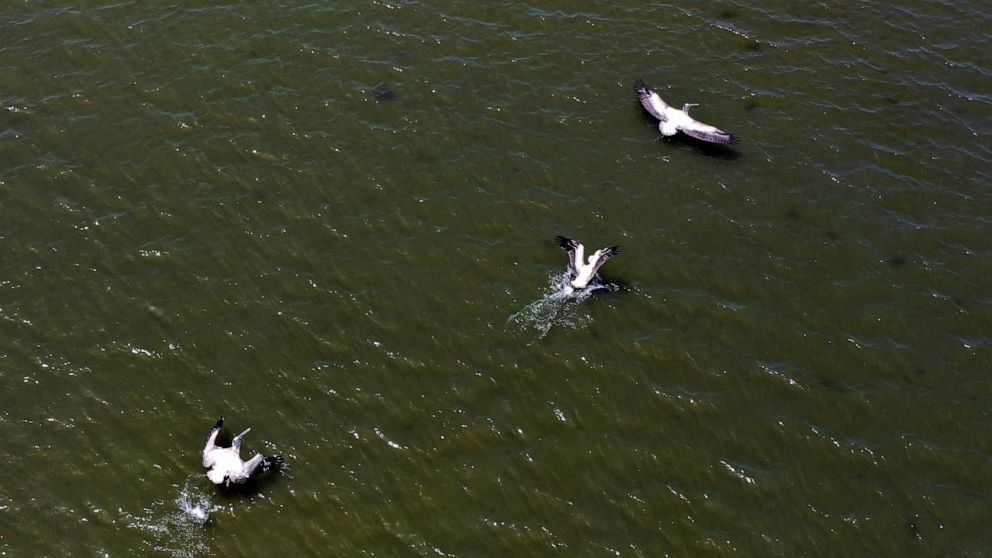Colony of shy Albanian pelicans flourishes during pandemic
DIVJAKA, Albania — The pandemic has brought one good thing to western Albania’s Divjaka-Karavasta Lagoon — badly needed peace and quiet for endangered mating pelicans, and resulting population growth.
Regional environmental officials say nesting pairs have increased by one-fifth in the last two years, from 68 in 2019 to 85 this year, even as numbers of human visitors have halved. They’re huge birds, reaching up to six feet (nearly two meters) in length and 11 feet (more than three meters) in wingspan.
The seaside Divjaka-Karavasta National Park covers around 22,000 hectares (55,000 acres), including a long sandy beach, a saltwater lagoon dotted with mudflats and tiny islands and a strip of pine forest. Situated 90 kilometers (60 miles) southwest of the capital, Tirana, it’s home to around 260 bird species.
But it’s best known for the “curly pelicans,’ as the locals call the giant Dalmatian Pelicans, who have their only nesting colony in Albania here — on minute Pelican Island where they spend December to June.
Pelicans are an endangered species in Albania, where their numbers fell in 2001-2003 to as low as 19 nesting couples, compared to 250 a century ago.
“Peace and quiet during the pandemic has helped us a lot in the preservation of Pelican Island,” said Adrian Koci, head of the Regional Agency of Protected Areas.
In 2014 Koci and his staff of fewer than two dozen started to take care of the 150-200 square-meter (1,600-2,150 square-foot) islet.
People in boats were banned from approaching nearer than 200 yards (180 meters). A net kept fishing boats away. And a 24-hour guard was installed in a small cottage across the water to protect them. Small wooden fences along parts of the waterways prevent erosion.
Koci regularly checks on the island with a drone during the January-June reproductive period.
“We have freed the island of the fishermen who disturbed the pelicans. We have raised their nests threatened by the tide,” he said. “But intensive fishing around has, nevertheless, reduced the number of fish the pelicans eat.”
Koci, a veterinarian, also cares for other injured birds from as far afield as neighboring Kosovo and Montenegro. A few years ago, the U.N. Development Program helped him launch Albania’s first bird recovery center.
A rare vulture found injured in Montenegro was treated for two months there and then let free to continue its trip toward Africa.
Two Dalmatian Pelicans, named Johnny and Vlashi, have called the center home for the past three years. Johnny can’t fly because of a damaged wing. But Vlashi can, and both are relaxed with visiting tourists. Staff regard them as part of their family, and often buy fish themselves to feed them.
Since the initial UNDP funding, the center has had little financial support — from donors, a small volunteer money-collecting box, even contributions from its staff.
This creates a dilemma: The site is increasingly popular with visitors, not always an advantage when dealing with shy birds need calm to reproduce. From 1,300 in 2014, visitors rose to a difficultly manageable 550,000 in 2019. Last year, that number was halved because of the pandemic. Staff say that on the whole it would be better to regain visitors lost to the coronavirus restrictions as their donations are badly needed.
Klara Perinova, 28, drove from Prague to spend two weeks in Albania with her boyfriend. She praised Divjaka’s “undiscovered beauty.”
“We’re here (because) you have a very beautiful nature, really endangered species, not the same nature you can see in other parts of Albania,” she said.
Koci is trying hard to preserve the largely undisturbed environment of the lagoon, urging local authorities to replace the engines of the five boats used by tourists with electric ones, or to install more solar power panels.
Limya Eltayeb, the UNDP’s resident representative, said the U.N. organization is supporting Albania in implementing “nature-based solutions” in Divjaka and elsewhere, and helping the center to become self-sustainable — beyond the small state funding and private donations.
“Tourists are made welcome here, including by Johnny and Vlashi,” said Ervin Allushi, one of the center’s experts. “Visitors often help (financially). Although the pelicans over there on the islet don’t want them nearby.”
———
Follow Llazar Semini at https://twitter.com/lsemini
———
Follow AP’s pandemic coverage at:
https://apnews.com/hub/coronavirus-pandemic
https://apnews.com/hub/coronavirus-vaccine
https://apnews.com/UnderstandingtheOutbreak
![]()


